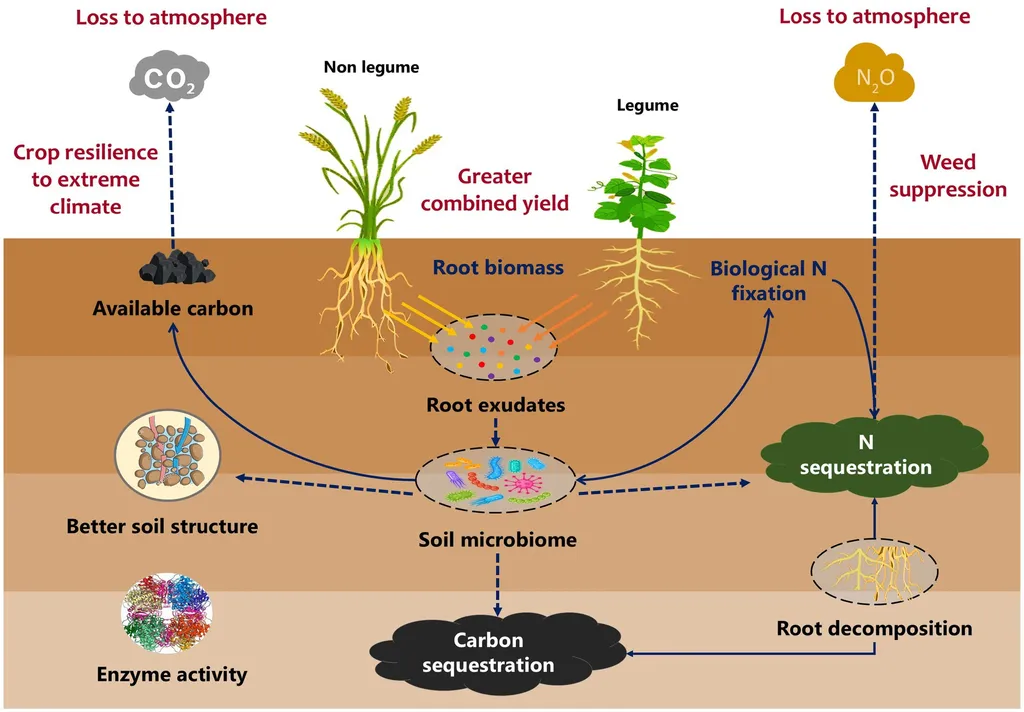In the quest for sustainable agriculture, intercropping has long been recognized as a powerful tool to enhance soil health and crop productivity. Now, a recent study published in *Frontiers in Microbiology* sheds new light on how intercropping can reshape the microbial communities associated with arbuscular mycorrhizal fungi (AMF) spores, offering promising insights for the agriculture sector.
The research, led by Liyan Zhou from the Key Laboratory of Biology and Genetic Improvement of Horticultural Crops (Northeast Region), Ministry of Agriculture and Rural Affairs, Northeast Agricultural University, Harbin, China, compared the effects of tomato monocropping versus tomato/potato-onion intercropping on the composition and diversity of AMF spore-associated bacterial communities in the tomato rhizosphere. Using advanced sequencing techniques, the study revealed that intercropping significantly increased the diversity of these bacterial communities and altered their taxonomic composition.
“Intercropping systems optimize soil ecological functions and enhance crop productivity,” Zhou explained. “Our study demonstrates that tomato/potato-onion intercropping reshapes the AMF spore-associated microbiomes, selectively enriching microbial taxa with putative functions in nutrient cycling and plant growth promotion.”
The findings showed that intercropping enriched taxa such as Actinobacteriota and Cyanobacteria, as well as specific classes and genera like Janthinobacterium, Rhodococcus, Paenarthrobacter, and Streptomyces. These microbial communities play a crucial role in maintaining AMF spore viability and supporting AMF function, which are essential for sustainable agriculture.
The commercial implications of this research are substantial. By leveraging plant-AMF-bacteria synergies, farmers can potentially reduce their reliance on chemical fertilizers and enhance soil fertility. This not only cuts costs but also promotes more sustainable and environmentally friendly farming practices.
“Understanding how intercropping affects these microbial communities is a game-changer,” said a spokesperson for an agricultural technology firm. “It opens up new avenues for developing biofertilizers and other microbial-based products that can improve crop yields and soil health.”
The study’s findings could also pave the way for more targeted and effective intercropping strategies. By identifying the specific microbial taxa that thrive under intercropping conditions, researchers can develop tailored approaches to optimize soil health and crop productivity.
As the agriculture sector continues to seek sustainable solutions, this research offers a glimpse into the intricate world of soil microbiomes and their potential to revolutionize farming practices. By harnessing the power of intercropping and AMF spore-associated bacteria, the future of agriculture looks not only more productive but also more sustainable.
Published in *Frontiers in Microbiology* and led by Liyan Zhou from the Key Laboratory of Biology and Genetic Improvement of Horticultural Crops (Northeast Region), Ministry of Agriculture and Rural Affairs, Northeast Agricultural University, Harbin, China, this study provides a foundation for future developments in the field, offering hope for a more sustainable and productive agricultural future.

